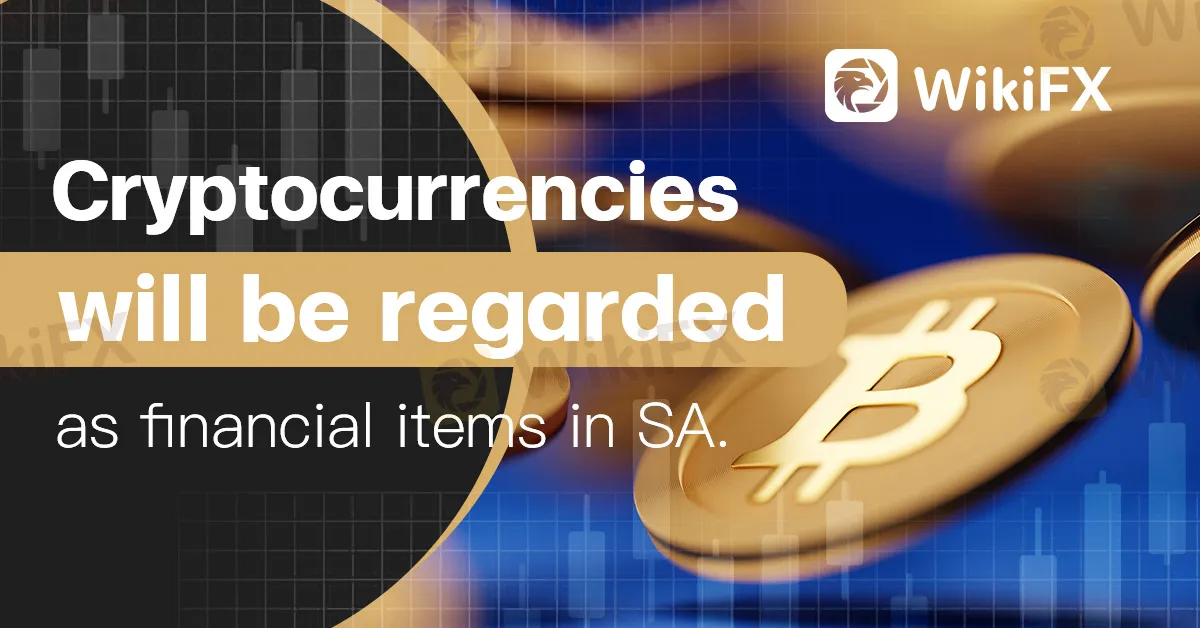简体中文
繁體中文
English
Pусский
日本語
ภาษาไทย
Tiếng Việt
Bahasa Indonesia
Español
हिन्दी
Filippiiniläinen
Français
Deutsch
Português
Türkçe
한국어
العربية
Cryptocurrencies will be regarded as financial items in SA.
Abstract:The classification of bitcoin assets as financial commodities in South Africa will make it easier for regulators to monitor the market and support consumer protection.

The classification of bitcoin assets as financial commodities in South Africa will make it easier for regulators to monitor the market and support consumer protection.
All traders should use WikiFX to locate reputable brokers. A forex broker search tool called WikiFX lets users rank and review firms. Both the Play Store and the Software Store offer the app.
The Financial Sector Conduct Authority referred to cryptocurrency assets as “a digital representation of value” in a gazette notification published on Wednesday. The release claims that a cryptocurrency asset can be electronically exchanged, transferred, or held for use as a medium of exchange, a means of investment, or for other purposes without being created by a central bank.
The announcement is the first legal step required to put the crypto-asset market under South African law, according to Brent Peterson, head of law at cryptocurrency exchange Easy Crypto.
The declaration, which takes effect immediately, coincides with efforts being made by governments throughout the world to regulate cryptocurrencies in order to protect users from hazardous virtual currencies and con artists. US lawmakers and officials are searching for ways to limit how stablecoins are used.
The licensing requirements that will result from this classification, according to Marius Reitz, general manager for Africa at cryptocurrency platform Luno, “will drive high standards in the industry, particularly in relation to consumer protection, with potential investors being able to easily identify those providers that satisfy regulatory requirements.” Another significant benefit is that financial advisors can formally advise clients on bitcoin investments.
By 2020, 15% of South Africans, according to Global Web Index, will be Bitcoin owners. The young industry has already experienced failures, such as Mirror Trading International's demise last year, which led to losses of almost $1.2 billion. The South African Reserve Bank has been working with international regulators to recognize the coins as financial instruments, making it easier to monitor the coins for money laundering and terrorism funding.
According to Hannes Wessels, head of operations for Binance South Africa, this move will promote clarity, user protection, and much-needed ecosystem confidence.

Disclaimer:
The views in this article only represent the author's personal views, and do not constitute investment advice on this platform. This platform does not guarantee the accuracy, completeness and timeliness of the information in the article, and will not be liable for any loss caused by the use of or reliance on the information in the article.
Read more

5 Risks associated with Grand Capital
You can avoid fraud, crypto scams, and similar traps simply by staying informed. If you regularly follow forex news, there’s a lower chance that you’ll fall victim to such scams. Being aware is the only way to stay safe. That’s why you also need to know about the Grand Capital broker and why it should avoided.

Avoid Trendify: 5 Red Flags Revealed
Trendify is nothing more than a scam broker. It is one of those forex brokers that acts genuine but is actually full of red flags. Before you invest and fall victim to its investment scam, its better to check out the risks involved with Trendify.

Forex Interbank Rate & How It Influences Your Trading
A forex interbank rate is nothing but the wholesale currency exchange rate that banks and other major financial institutions use to trade currencies among themselves. Read more about it.

10 Unlicensed Brokers Exposed – Check Now to Stay Safe!
Traders need to stay informed, as scam brokers are active in the forex market. It's a basic rule for forex beginners to stay updated and check the Warning List. Here is the Warning List of unauthorized brokers you should avoid.
WikiFX Broker
Latest News
Forex Hedging: Is It a Trader’s Safety Net or Just an Illusion?
OPEC+ members agree larger-than-expected oil production hike in August
FCA clarifies expectations on bullying, harassment and violence to deepen trust in financial service
Asia-Pacific markets mixed after Trump shifts goalposts on tariffs again
XS.com Expands Global Reach with Landmark Kuwait Launch
European markets set to open mixed amid fresh U.S. tariff threats
Top Wall Street analysts are pounding the table on these 3 stocks
Stock futures fall after Trump team says tariffs will go into effect on Aug. 1: Live updates
Goldman Sachs revamps Fed interest rate cut forecast for 2025
Gold Prices to Fluctuate This Week Amid July 9 Tariff Deadline, Fed Policy
Currency Calculator


